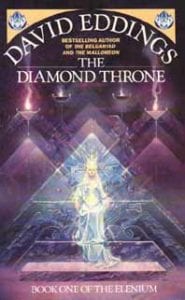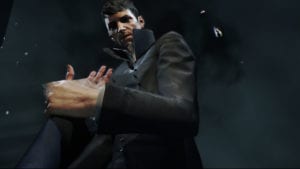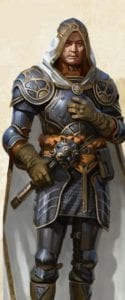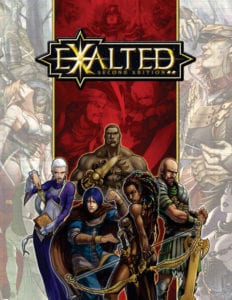Religion in Fantasy I: Very, Very Real (And Very, Very Angry)
Religion is a touchy subject, effectively in any society that’s not entirely religiously homogenous. The metaphor of treating it like a penis is popular for a reason. For the same reason, most books that are not explicitly meant to be religious literature avoid the topic like the plague. And yet, when you are a fantasy author, you stand before an unpleasant necessity. Most commonly, part of your job description is to create a new imaginary world. And if you want the world to feel real and complete, you should have it include all aspects ours does—including religion.
Some authors avoid this, of course, especially those whose fantasy world is created in some subsection of our own. Rowling cheerfully pretends there is no religion in Harry Potter stubbornly enough some fans actually believe wizards are not religious, in spite of the rather conspicuous presence of Christmas and Easter as the two major holidays in their calendar.
But this is a minority choice when creating worlds from scratch. Most authors recognize that as religion played such an important part in our world, it should be in some way included in their as well, unless they want to create society radically different from any human one—something very few actually go for. Instead, they attempt to create religious systems within their larger worldbuilding, with varying success.
Part of the problem is the particular relationship of fantasy to religion. As a genre, it has developed from folklore and mythology, and as such, its ties to religion are built into its very foundations. But at the same time, the religious systems presented by authors in their world are often entirely disconnected from the mythological and legendary background on which they build their world. There are exceptions—the vaguely medieval worlds where the religion is, well, vaguely like Christianity, chiefly—but very frequently these two things are independent of each other, which sometimes leads to strange results.
Related to this is the question of how the author even understands religion. Scholars of religious studies have been trying to find a definition for over a century without success, so it is no wonder that each fantasy author approaches the problem differently. As we will see later in this series of articles from Barbara and Michał, many do so in a way that bears no resemblance to any actual existing religious systems.
The other way in which fantasy has a special relationship to religion is through its magical and supernatural elements. Religions are traditionally connected to miracles or other events we would consider outside the ordinary, and the line between it and magic is often very thin and porous, in spite of what most representative of monotheistic religions would have you believe. So that puts fantasy authors before a choice: either take the supernatural aspects of religions seriously and make them part of the supernatural aspects of their universe, or ignore them entirely and make these two things separate. How they decide in this and how they approach the solution is what forms perhaps the biggest difference regarding the approach to religion in fantasy.
If It Bleeds We Can Kill It
“Faith is the substance of things hoped for, the evidence of things not seen”—so judges Paul of Tars. By his estimate, then, quite a number of religious characters in fantasy would in fact have no faith at all, because the gods they believe in are very tangible, and obeying or disobeying them often has concrete results in a provable way. Not that we should put too much stock in Paul, but still, making this choice automatically marks your religion as different from the real world ones, and it has consequences for the whole way religion would be regarded. Authors and writers sometimes explore them, sometimes not.
David Eddings
A writer who relies on his skill and doesn’t worry too much about originality, Eddings has produced two series where gods verifiably exist, and their actions shape the narrative. The first is the Belgariad pentalogy, followed by Malloreon, the other being Elenium, followed by Tamuli.
Belgariad’s entire plot revolves around the gods’ internal wars, which mortals have to fight. There’s several gods, most of them with their own nation. Belar is the god of the Alorns, Chaldan is the god of the Arends, Nedra is the god of the Tolnedrans, Issa is the god of Nyissans, Mara is the god of the extinct Magars and Torak is the god of all the Angarak nations, who seem to equal all the other ones in number. Aldur is the one god without a nation, only a group of devout worshipers. No goddesses are in evidence.
god of the Arends, Nedra is the god of the Tolnedrans, Issa is the god of Nyissans, Mara is the god of the extinct Magars and Torak is the god of all the Angarak nations, who seem to equal all the other ones in number. Aldur is the one god without a nation, only a group of devout worshipers. No goddesses are in evidence.
A number of people worship the mysterious UL, but they first had to supplicate him, as they were among those left godless. People without a god to call their own are drifters and vagabonds, with no place to call their own. Some worship lesser spirits. The moral implications of gods leaving some of the people they’d created out to dry are… well, entirely ignored. UL turns out to be, in fact, the father of all the other gods.
Belgariad revolves around Garion, an intensely archetypal farm boy with a great destiny, who has to defeat the evil god Torak. But even as the gods are visible; their impact on the societies is not. The people of the Belgariad exist perpetually in several cultures that superficially resemble real-world historical ones—and it seems they have for thousands of years. One can chalk it up to the gods molding their people in their image, but…it doesn’t really show.
We see some priests and there’s mentions of “theological texts”. Except what kind of theology do we even have, if the gods are a fact of life and occasionally talk to people? If the followers of Belar say that he told them something, the others don’t need to take it on faith, like with real-life commandments.
The Elenium series is a different kind of world. More grim and down to earth. The continent of Eosia is populated mostly by nations who worship the Elene God. It’s more or less a carbon copy of the Catholic Church… minus, well, a Christ analogue. I’ll expand on that in another article.
The existence of the Elene God is ambiguous until the sequel series, Tamuli, where we learn that he does exist, and his innumerable followers make him powerful…he just doesn’t do a whole lot. It’s not clear if Eddings intended it from the start, though. We do know, however, that the Styric gods exist. The Styrics are a separate group dwelling among Elenes, sharing many similarities with the Jews and the Roma, including frequent pogroms on them by Elenes.
The Styric gods grant them magic, but it’s not enough to give the Styrics an edge against Elenes. Styrics are less aggressive and combative by nature… not sure if there’s some unfortunate implications hiding in here. Apart from that, though, they’ve got a taboo against iron, which they inherit from their gods. Making them easy prey for Elenes, who wield iron and steel.
The machinations of the Styric gods drive the plot of the first series. The pantheon consists Elder and Younger gods. The former were there at the world’s creation and they inadvertently created the Younger gods (who are a thousand in number). Who imprisoned their older siblings to stop them from doing more damage. Now one of them is trying to get out.
There’s more deities in the world, some of whom appear in the sequel series, but you get the picture. The gods are once the ones to set things in motion, even as mortals fight their battles and carry out their schemes. But apart from the Elene God, who is aloof at best, the narrative treats them as… well, people. There are gods, but there’s no religion. Gods are simply powerful players, moving their pieces around the board. Tamuli involves a fairly staggering number of gods working on the protagonists’ side, and there’s no real difference between them and the mortals. The gods are just more powerful and knowledgeable.
Mysterious Powers in Video Games—Elder Scrolls and Dishonored
These two universes are different in very many ways, but some of their divine characters do have a lot of similarities, hence this grouping under the same heading.
The chief similarity is the questionable nature of their divinity.
We will give more space to the question of what exactly makes a god in another installment of these articles. The important bit here is that the beings I’m talking about here, the Daedra and The Outsider, don’t usually receive worship, nor do they exactly have a religion in a strong sense of the word around them.
Yet they are definitely inhuman and superhuman, and in a more substantial way than superheroes are. They also interact with humans (and assorted other species, in case of Elder Scrolls), and humans often try to gain their favour. They are usually willing to bestow it, but for a price.

It could be said that these powers are the dark side of deities in some ways, since their character is definitely ambivalent at the very least. They look down on humans, and usually when one does a quest for a Daedra, it’s one of a morally dubious nature.
The Outsider from Dishonored, too, stands beyond good and evil, and his worship when it exists has the character of a secret cult that faces disapproval and even punishment by the law. He, too, can grant great power to those he chooses, though he doesn’t ask for a price in the usual sense of the word. His entertainment at the effects he observes is payment enough to him. Both the Daedra and The Outsider worship draw direct inspiration from Satan worship and other persecuted religious practices, which largely frees them from the necessity to build a believable religious system around themselves. However, they add nuance and ambivalence to the character of the forbidden deity in question that is usually missing in fantastic deities.
It is a bit of a paradox, since ambiguity is exactly what most deities from polytheistic societies have plenty of, and what fantasy usually fails at capturing in its more conventional pantheons. In some ways, the Dadra and The Outsider are the closest to real world deities we can find—except, of course, for that direct and immediately provable interaction with humans they are capable of. The superpowers they frequently grant that have a more dependable quality than is usual with miracles.
The unreliability of the deities themselves partly compensates for it, though. You can always count of the powers or rewards granted to you, but you cannot count on the deity to appear when you need them to grant you something, or on them to be willing to grant it because you need it for a good purpose and are asking very nicely. That buts some uncertainty back into the whole system, and paradoxically makes these as close to real world religions as they are different in other ways. These deities are both ambivalent and quite simply fundamentally different from humans. These are two crucial aspects of deities in most polytheistic cultures.
(Tellingly, there is another set of supernatural beings in The Elder Scrolls—The Aedra—who are closer to conventional gods and so much less ambivalent…and so much less interesting.)
Dungeons and Dragons
D&D has one of the most consistent and logically thought out systems of religion in the entire fantastic genre. It just so happens that its nature makes you question whether we should call it religion at all.
Gods are extremely powerful beings who live on planes different from the Material one (the one that corresponds best to the world as we know it). They are of all persuasions of the D&D alignment chart (any combination of good, neutral, evil and lawful, neutral, chaotic). Because of these two characteristics, the wars they could lead against each other would be completely destructive. For this reason, they made a pact not to interfere with the world directly, but only through their faithful—chiefly, this means clerics.
There are two kinds of magic in D&D—arcane and divine. While this might seem like it resembles the distinction between magic and miracles from the real world, in reality it’s a little different. Where the difference between magic and miracles appears in religions, it’s usually an ethical judgement—magic is wrong and immoral, in some traditions from the devil or demons. In D&D, though, the distinction is purely instrumental: the effects are either granted by the power of the mage itself, or by the will of the deity worshipped by them. Thus the magical power of clerics derives more from their divine favour and their devotedness then careful study or innate talent (as with wizards and sorcerers respectively).

The effects of divine spells, however, are known just as exactly as the effects of the arcane ones. Prayer of a cleric, in D&D, is not a “hope for things not seen”—they know exactly what they get for their money. Metaphorically as well as figuratively, since the material components that are often necessary for casting are frequently quite costly. Essentially, relationship to your deity becomes much like your relationship to your king. In some cases, it can be very business-like, in some others there will be a lot of personal loyalty. It is unequal, but there is no uncertainty that would create space for faith. Not all real world religions are about faith, of course, and many focus on proper practice instead.
Yet that doesn’t seem to matter very much in D&D either. These deities function within logic that is identical to “material world logic”, something not usually the case in religions. So there is no focus on regularity of worship and major religious festivals do not play crucial part. When deities work like people, it’s hard to imagine they would care about such things. You just turn to your god when you need something from them, and if they judge you worthy they grant it to you. That’s about it. The consequences of the direct cause-effect relationship receive a thorough exploration, resulting in a consistent system that is very different from real world religions.
There is also a plurality of deities in this world with a rather loose relationship towards each other. This, perhaps, is what makes the system most unlike any real world religion. Pantheons in polytheism are mostly commonly systems where the relationships between deities reflects something about how the culture sees the relationship between things in the material world. Indeed, that is the most important thing about gods’ relationships to each other. In the Dungeons and Dragons universe, however, there is only occasionally some friendship or rivalry between the deities. Generally speaking, they function not like a family (as is most common in real world pantheons), but like a company of unrelated humans would.
This, of course, is where the lack of relationship between the religion and the world it supposedly exists in comes into play. Because this situation between the gods reflects quite well the situation of our own individualistic society. Most D&D worlds, however, are still vaguely medieval-like, with feudalism in full force. In other words a system where kinship plays a most important role. How does a society like this function with the extremely pluralistic religion this world purports to have, where people worship different deities with hardly any relation to each other all across the world, and no one minds?
The answer to that is simple: the religion there does not usually play the extremely important role in society it did across history and geography. Its role is more akin to alternate cults and minority faiths, not a force that shapes all around it. In other words, once again, it’s closer to the role of religion in a secularized society. Just with a special kind of spellcasters to spice it up a bit. Once again, a believable result of a world where gods are, effectively, much more powerful people, and their society works like ours. Religion is important as a source of power, but not that extremely important otherwise.
Exalted
I wanted to save Exalted for last, since it’s a fairly unique example. It’s a tabletop roleplaying game, originally by White Wolf and now by Onyx Path (it’s complicated), where the players take the roles of the eponymous Exalted. The word means mortals endowed with power by gods and other powerful beings.
As far as gods are concerned, what makes Exalted unusual is a fairly stark and… I won’t say realistic, but believable portrayal. Creation (the setting of the game) contains many gods, and they vary wildly in power. The most powerful of them are closest to the typical aloof fantasy gods. They’re Celestial Incarna—the Unconquered Sun, Luna and the five Maidens of Destiny (Mercury, Venus, Mars, Jupiter and Saturn)—stay in Heaven and don’t interfere much with the world. They empower the Solar, Lunar and Sidereal Exalted, however, who are the mightiest of them.

Below the Most High, though, teems a throng of gods great and small. One thing that binds them all together is that they all have areas of influence and control, that they oversee and order. They might be small, like a single river or mountain. But they may be greater, like entire regions, cities, or the weather in an entire swathe of Creation.
It used to be that gods organized themselves in courts and a celestial bureaucracy, but both of those systems have fallen apart by the time the game starts. Nowadays, Heaven is corrupt and the gods on earth freely threaten and extort worship from mortals. The Exalted can keep gods in check with their power, but mortal humans are often at their mercy.
Exalted is unique for how physically present it makes the gods. The wide range of gods actually suits some real-life polytheistic faiths, and the gods are present and active in the world. After all, why wouldn’t be? They hold dominion over it with their power. Even if it’s just a small, insignificant domain. Instead of coming up with reasons for why gods don’t affect the world with their might, the setting assumes they do and shapes itself accordingly.
Gods in fantasy are often in an awkward position of “real but not terribly relevant”, with Eddings and Dungeons & Dragons being good examples. They exist, but the religions they spawn are imitations of real-world religions…written by people who don’t know a whole lot about them. Exalted takes it in a completely different direction, making them a part of the landscape. They play a central part in how Creation operates. Mortals supplicate them, cajole and worship. The Exalted bargain with them, fight them or even press them into their service. Religion is a wholly… pragmatic thing in Creation. You don’t worship a god because you agree with them or think they’re mortally superior. You do it because you want them to grant you a boon or just so they leave you alone and let you live your life in peace. It’s very down to earth and believable.
This is one of the ways you can make the system consistent. You take the fact that you made your gods real in a tangible way seriously, and change the religion and society accordingly. Exalted and Dungeons and Dragons both strive to do so, but Exalted achieves a more distinct result. The Elder Scrolls and Dishonored, on the other hand, managed to change some of their divine characters so that, in a roundabout way, they reached an effect similar to real world religions. Eddings, meanwhile, is more of an example of what sloppy worldbuilding looks like when it comes to religions.
***
Tune in in a month or so to find out more, this time about a fairly ubiquitous situation where the dominant religion of a fantasy setting is a copy of Christianity. Or to be specific, Catholicism. Which very often limits itself to superficial similarities.

